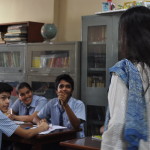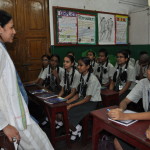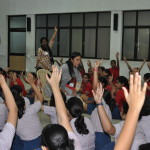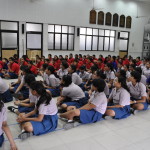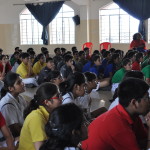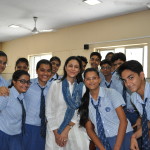In a day and age where the practise of writing letters on paper has become restricted to the English language paper in the board examinations, an activity that relies heavily on this tool of communication comes as a breath of fresh air. Added to this is the fact that these letters will be written by middle and high school students in Kolkata and sent to their counterparts in Karachi, following which there will be an exchange of not just letters, but postcards, posters and collages and then videos, making it a truly special activity.
The Exchange for Change program, first launched in 2010, an initiative of the Citizens Archive of Pakistan (CAP) is working with over 6,000 students in India and Pakistan and aims to show that dialogue between the two countries, so often mired in poor politics and strife is not only possible, but also sustainable. This year the program has come to Kolkata where PeaceWorks is the collaborating partner.
We are excited to work with six schools in Kolkata namely Abhinav Bharati High School, Chowringhee High School, La Martiniere for Boys, Lakshmipat Singhania Academy, Modern High School for Girls and Saifee Hall. The number of participants has surpassed our initial target with more than 560 students taking part in the program.
Curiosity about one of our closest neighbouring countries knows no bounds. Questions ranging from what do people in Pakistan wear, where they go to ‘chill’, whether they have big, fat, ostentatious weddings like one sees in India, to ones on a more serious note, such as the Kashmir issue, politics and whether there is a possibility of India and Pakistan uniting as one country were asked during the Orientation workshops conducted by PeaceWorks and Swaleha Alam Shahzada, Executive Director at CAP.
Much laughter and excitement ensued when we realised that biryani, cricket and paani puri were hot favourites amongst Pakistanis as well! Teachers in charge joined in on offering suggestions about food Ms Shahzada could try while in Kolkata.
Phase 1 of the project has already begun, with students and teachers writing letters to ‘a dear friend’ across the border. Photography will be the primary component of Phase 2 while Phase 3 and 4 will involve oral history interviews and video documentation of the process. We look forward to receiving the first batch of letters from the participating schools during the course of the week.
This is the world’s largest track 2 diplomacy initiative and we are very excited to be a part of it!
– Paroma Sengupta

